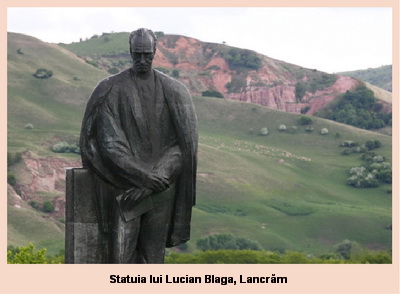Poetry in Translation (CLX): Lucian BLAGA (1922 – 1985), “Dernier mot” (Ultimul cuvânt)
DERNIER MOT (Ultimul cuvânt)
Lucian BLAGA (1922-1985)
Pèlerin d’étoiles,
j’ai perdu
l’antique zodiaque.
La vie, avec le sang et les contes
M’ont glissé entre les mains.
Qui me dirige sur l’eau?
Qui me passe à travers les flammes?
Contre les oiseaux, qui me protège?
Les routes m’ont chassé.
La terre de nulle part
Ne m’a appelé.
Je suis maudit!
Avec le chien et les flèches qui me restent
Je m’enterre,
à tes racines je m’enterre,
Dieu, arbre maudit.
En Français par Constantin ROMAN
Bucarest 1963, Londres, 2013
© 2013, Copyright Constantin ROMAN
BIOGRAPHICAL NOTE:
Lucian Blaga
(1895, b. Lancram, Transylvania, – d. Lancram, 1961),
Poet, Academic, Philospher, Historian, Political Prisoner
If Cioran is considered the contemporary extension of Nietsche, and his thoughts written in French are translated in many languages, Lucian’s Blaga’s works remain highly mystical, close to the primeval myth and to his village roots and, sadly, very little translated in foreign languages.
Like Cioran, Blaga was born the son of an Orthodox priest in a small village of Transylvania at the time when this province was still part of the Habsburg empire. By the time of his maturity his contribution to Phylosophy and poetry was recognised by being elected a Fellow of the Romanian Academy, just before the Second World War. With the advent of Communism in Romania the last two decades of his life were spent in obscurity, interspersed with time in the Communist prisons, reduced to silence and physical incapacity.
Between 1943 and 1946 Blaga published some of his major philosophical works; the “Trilogy of Knowledge,” “The Trilogy of Culture” and the “Trilogy of Values”. Two further titles – the “Cosmogonic Trilogy” and the “Pragmatic Trilogy” respectively had their publication barred by the advent of the Marxist dictatorship. The philosopher is made to renounce, his ideas, under duress. He is dismissed from his Chair of Philosophy at the University of Cluj and compelled to take up a job as librarian. But soon he is forced to renounce even this modest position, for he spends more and more frequent spells in jail, as a political prisoner.
Lucian Blaga dies in 1961, only a few years after he is released from prison.
(Extract from “Voices and Shadows of the Carpathians”, by Constantin ROMAN)





No Comments so far ↓
Like gas stations in rural Texas after 10 pm, comments are closed.